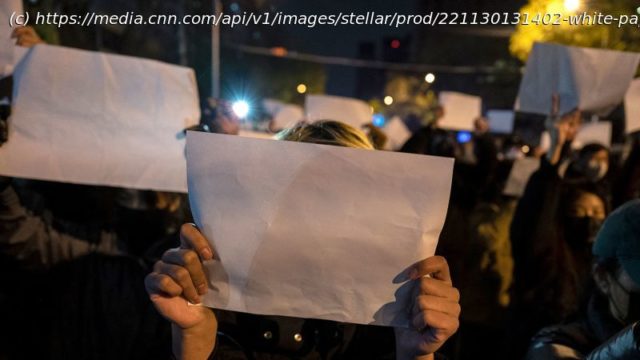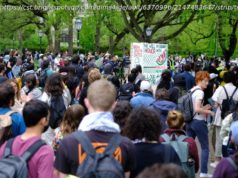From math equations to teddy bears and imaginary dates in the calendar, Chinese protesters have over the years come up with ingenious — and very funny — ways to get around censors, write Christopher Rea and Jeffrey Wasserstrom.
It transforms the most powerful man in the country into a teddy bear.
It adds to the calendar the imaginary date of May 35 to invoke a people’s uprising that government censors seek to erase from memory.
It mobilizes the public to expose sexual predators with the unlikely affirmation, “Rice Bunny!”
We refer, of course, to a quality as widespread among China’s people as it is absent among its leaders – comic ingenuity.
May 35 stands in for “June 4,” Chinese shorthand for the 1989 massacre commonly known in English as “Tiananmen,” and a phrase the People’s Republic of China censors have tried to scrub from the internet.
Emojis of a bowl of grain and a small rabbit were another work-around. When censors banned the phrase “#MeToo,” a substitute meme emerged: rice (“mi”) and bunny (“tu”). More about the bear below.
If the People’s Republic of China calls to mind a rising power, a strategic competitor, a powerful autocracy, you are probably thinking of its government. The party-state is nothing if not consistent in its efforts to convince the world, through the bellicosity of its leaders’ public statements, that the Chinese political sphere is utterly humorless.
Nothing could be further from the truth. Chinese humor has a rich and varied history of feeding on political folly and its consequences.
Consider the recent protests roiling cities across China. In the Xinjiang capital of Urumqi last week, a fire in an apartment block claimed the lives of 10 people, believed to have died due to a stringent Covid-19 lockdown that made their escape difficult. The tragedy sparked extraordinary outbursts of public defiance against the “zero-Covid” policies that have left millions of people feeling trapped and helpless, and these particular victims with no escape from the flames.
People who take to the streets against the Chinese government risk detainment, arrest – and worse. This is especially true of those who dare, as some did, to shout out slogans not just for lifting lockdown, but for broader political change. Yet the mourning and the earnestness has been leavened by playfulness: parody of official rhetoric, mockery of censors and insouciance toward a paternalistic leadership.
When official media tried to discredit the protests as the work of “foreigners” (a typical ploy, also beloved by other oppressive governments, like Russia and Iran), students in Beijing responded with sarcasm. “Who might those foreigners be?” they replied. Perhaps the ideological icons the Chinese Communist Party has been imposing on the populace for generations, Marx and Engels?
Last week, students at Beijing’s elite Tsinghua University were seen holding up sheets of paper printed with a physics equation dating to the 1920s.






